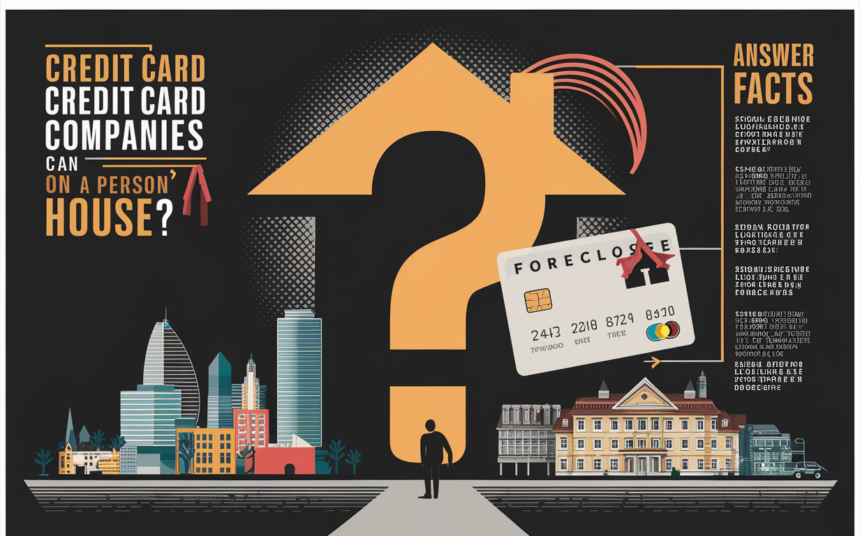For innumerable Americans, credit card debt has become a serious financial obstacle. Anxiety over the possible repercussions of outstanding credit card debt is growing as interest rates climb and pressure to make minimum payments gets more intense. In this setting, a frequent question is whether credit card companies have the power to foreclose on a house. Although the response could first seem simple, more sophisticated knowledge exposes a complicated interaction of elements.
Credit cards’ appeal for simple credit has helped them to be used so widely. Still, the ease sometimes comes at a great cost. High interest rates combined with uncontrolled expenditure can rapidly cause a debt spiral that is difficult to get out from under. Fears about the possible consequences of skipping credit card payments intensify as people try to balance their financial responsibilities. Usually connected with mortgage failures, the word “foreclosure” causes many homeowners to struggle with credit card debt.
Homeownership and Credit Card Debt: An Interactive Relationship
One basic difference occurs between mortgage and credit card debt. Credit card debt is unsecured unlike a mortgage, which is based on the property itself. Lenders thus grant credit based more on the borrower’s financial reputation than on a physical item acting as collateral.
This discrepancy has significant consequences. Should a mortgage default by a homeowner, the lender legally has the right to foreclose on the property to recover the unpaid debt. Credit card companies do not, however, have this option. This difference emphasizes the need for responsible credit card debt management since neglect of this might result in a variety of financial problems indirectly affecting homeownership.
Homeowners trying to preserve their investments must first understand these differences. Understanding the unsecured character of credit card debt and the possible results of poor management helps people to be proactive in preserving their financial stability and protecting their homes.
Could Credit Card Companies Foreclose Directly on Your House?
Credit card debt is unsecured unlike mortgages. This implies it lacks a certain asset, say your house, which supports it. Credit card companies thus lack the legal power to start foreclosure processes on your property to recover outstanding debt. Credit card companies lack this authority, unlike mortgage lenders who have a direct claim on your house as collateral.
Although the impossibility of credit card firms immediately foreclosing on your house would provide some relief, you should be aware that this does not protect you from the possible consequences of ignoring your credit card responsibilities. The mismanagement of credit card debt might set off a chain reaction that subtly compromises your homeownership.
Direct Effects of Unpaid Credit Card Debt
Although credit card companies cannot directly foreclose on your house to pay off debt, the consequences of ignoring your credit card responsibilities can be severe and may compromise your ability to be a homeowner.
One main result is a negative change in your credit score.
Your credit history shows consistent late or missed payments as a bad reflection. A bad credit score will seriously limit your chances of obtaining future loans—including mortgages. A low credit score could lead to increased interest rates or perhaps loan denial when it comes time to refinance or buy a new house.
Credit card companies could use aggressive debt-collecting strategies to get paid-off balances back. These initiatives can call on letters, constant phone calls, and even legal action. Litigations could result in decisions against you, with broad financial consequences. Sometimes creditors might get court orders to garnish your earnings, therefore lowering your discretionary income and challenging your ability to pay your mortgage.
Should your credit card debt escalate out of hand, bankruptcy could seem like a reasonable choice. Although bankruptcy offers relief from debt, it seriously damages your credit rating as well. Rebuilding your credit following bankruptcy is a slow process, hence getting a mortgage during this time can prove difficult. Certain bankruptcy forms may also cause you to lose your house should it have equity.
It’s important to understand that these side effects could set off a chain reaction, therefore endangering your homeownership. Consequently, good credit card management is crucial to preserve your financial situation and defend your house investment.
Keeping Your House Debt-Free from Credit Cards
Although credit card firms cannot take your house directly, unpaid credit card debt can seriously jeopardize your homeownership indirectly. Here are some ways you might protect your property:
The use of responsible credit cards is vital. Making deliberate purchases and giving full monthly payments priority will help you greatly lower your chance of building excessive debt. Learning good spending habits helps you avoid financial stress and its possible consequences.
Making a detailed budget helps you to see your income and spending. Carefully monitoring your money inputs and outflows will help you find places where spending might be cut back. This financial discipline helps you to properly distribute money, therefore guaranteeing regular credit card payments and preventing debt accumulation.
One smart way to control significant credit card debt is debt consolidation. Consolidating several loans into one loan with a possibly reduced interest rate could help you simplify your payback process and possibly save interest charges. This helps to lower credit card payment default risk and financial strain.
When one is in extreme debt, one should seek professional financial direction. Financial consultants and credit counselors know how to evaluate your whole financial condition and provide customized solutions. Their advice can help you create a viable debt payback schedule, guard your assets, and steer clear of catastrophic results including foreclosure.
Recall that maintaining your financial stability and safeguarding your house depends on effective debt control. These techniques can help you reduce credit card debt risks and safeguard your financial future using professional advice sought when necessary.
Conclusion
Although credit card firms cannot directly foreclose on your house, disregarding your credit card debt can have serious repercussions and may result in indirect foreclosure. Understanding the hazards and acting early to control your money will help you safeguard your house and financial situation.
FAQs
Is a lien on my house possible from a credit card company?
Credit card firms cannot directly place a lien on your residence. Credit card debt is unsecured, hence it is not supported by any particular asset, unlike mortgages. But as was already discussed, neglecting credit card debt might have indirect effects on your homeownership by lowering your credit score, thus affecting your capacity to refinance or sell your house.
A credit card firm can recover debt for what length of time?
The statute of limitations dictates the state-specific time a credit card firm is allowed to collect debt. Legal action a creditor can take to recoup a debt falls within this period. The debt does not vanish after this time; rather, the credit card company cannot prosecute you for it. Still, they can try to gather it using other channels.
The credit card debt statute of limitations is what?
States define their credit card debt statute of limitations differently. Usually, it runs three to ten years. Usually after this period, the credit card company cannot sue you for the debt. You should be aware, though, that the debt still exists and may lower your credit score.
Could I work with a credit card company to reduce my debt?
You can indeed bargain with a credit card provider to reduce your balance. Many have effectively bargained for smaller minimum payments or settlement amounts. Especially if you’re having trouble making payments, it’s worth a try. Get ready for relentless negotiations.
A credit card’s average interest rate is what?
Several elements affect the average interest rate on a credit card, including credit score, card type, and issuer. Generally, though, it’s more than other kinds of debt. Avoid carrying large sums and look about for cards with reduced interest rates.





